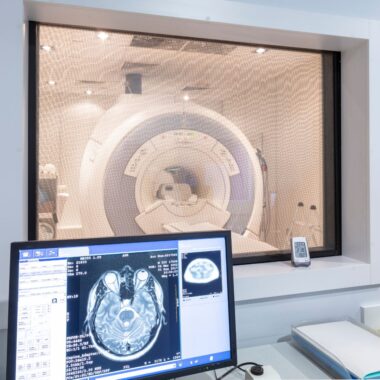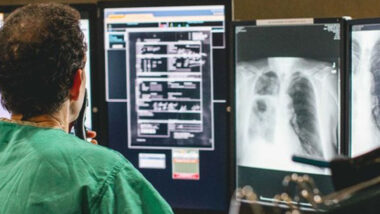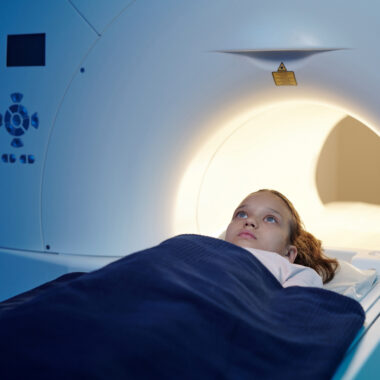Heart disease is the leading cause of death in the U.S. Yet many people who have heart disease don’t know they have it. Other people may know that their blood pressure or LDL (“bad”) cholesterol is a little high, but they aren’t quite sure whether these conditions increase risk for heart disease. Luckily, advances in imaging technology have made it easier than ever for doctors to evaluate plaque buildup inside arteries and better assess risk for the progression of heart disease or the potential for a cardiac event.
A conversation with your primary care physician can help determine whether you might benefit from a specialized CT scan known as CCTA or whether a calcium scoring test, another method for evaluating heart health, is right for you. Read on to learn the differences and similarities between these tests.
How Cardiac Imaging Can Help Your Heart
Cardiac imaging tests provide a snapshot of your heart, blood vessels and surrounding tissue. This advanced imaging can help your doctor diagnose conditions that could be causing symptoms like chest pressure, discomfort or pain, shortness of breath or weakness in the arms or legs. These can be signs of more serious conditions such as arterial abnormalities, coronary artery disease (CAD), or heart failure. If you have already had a heart attack or have been diagnosed with CAD, cardiac imaging can help your provider monitor your heart and arteries. Imaging can also help assess your risk for possible heart disease, heart attack or stroke.
There are two types of CT scans that are commonly used for cardiac imaging: cardiac CT for calcium scoring and coronary CT angiography (CCTA). Both scans show the amount of calcified plaque in your arteries, which can cause a heart attack or CAD.
What Is CCTA?
Coronary CT angiography is typically ordered for patients with acute or chronic chest pain to help diagnose the causes of various cardiovascular symptoms. This highly advanced X-ray is a valuable tool that helps doctors identify plaque buildup and blockages in the coronary arteries. CCTA scans also visualize blood flow to and from the heart and evaluate the structure and function of the heart.
CCTA is a non-invasive procedure often ordered after or in place of stress testing or after other tests have shown unclear results as to the cause of your chest pain. It is also used for patients with medical conditions who cannot manage more active or invasive procedures.
What Is a Calcium Scoring Test?
A CT calcium scoring test is primarily used to determine risk of heart attack for asymptomatic patients. Also called coronary artery calcium (CAC) scoring or cardiac scoring, this non-invasive, 10-minute CT scan measures the plaque buildup in your arteries, which can be evidence of coronary artery disease. A calcium scoring test is recommended for people who have intermediate risk factors for heart disease such as:
- Diabetes
- Family history of heart disease
- High blood pressure
- High cholesterol
- History of smoking, obesity or lack of physical activity
After the test, you will receive a score that ranges from zero — no evidence of plaque — to well over 300 — a higher risk of a heart attack. This score can help your doctor confirm a diagnosis and determine treatment options to manage CAD and related heart health symptoms and ideally, prevent more severe cardiac conditions like a heart attack.
Why You Might Need a CCTA or Calcium Scoring Test
While there are many reasons your doctor might order imaging of the heart, calcium scoring is primarily used to better define and diagnose risk in patients who may not be experiencing any symptoms or only mild heart health symptoms, while CCTA is primarily used in patients with acute or chronic chest pain.
Additionally, some high-hazard roles, such as military aviation, may require cardiovascular risk evaluation that includes imaging. The American College of Cardiology (ACC) has found that patients with stable chest pain may benefit from preventative CCTA, which can help identify other conditions, such as non-obstructive coronary artery disease.
Some patients may want to have calcium scoring before deciding whether to go on statins, a common medication to lower cholesterol. However, the ACC guidelines state that while calcium CT scoring may be considered for patients who are undecided about statins, it is not recommended for very low-risk or very high-risk patients.
Talk to Your Doctor About Cardiac Imaging
If you are experiencing heart health symptoms, chest pressure or discomfort, have a family history of heart disease or think that you could be at higher risk for a heart attack, you should talk to your doctor about whether cardiac imaging is right for you and to help diagnose the issue so you can seek treatment. Assessing your heart health — including plaque buildup inside your arteries — can help you make healthy choices. Taking certain medications, exercising regularly, eating a heart-healthy diet, and quitting smoking can help improve your heart health and lower your risk of heart disease.
If your primary care physician or cardiologist orders advanced imaging as a next step, the team at Charlotte Radiology will work with your doctor to ensure you have prompt, accurate cardiac imaging so that you can get started on your journey to improved heart health.



